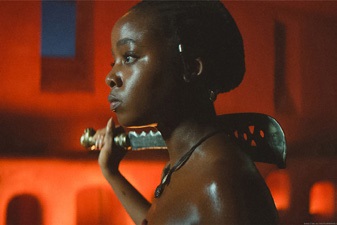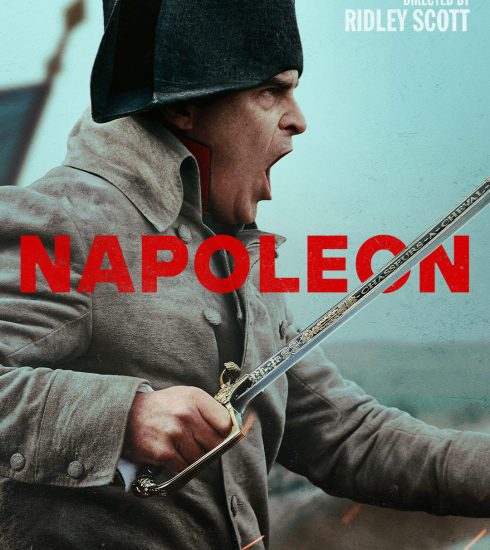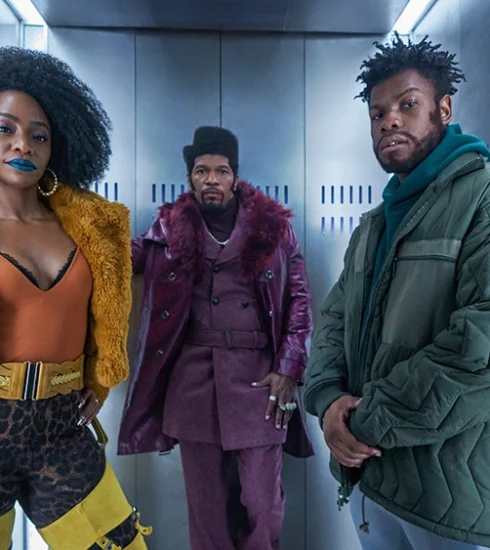Movie Review: The Woman King
In the opening scene of Gina Prince-Bythewood’s The Woman King, we see an imposing figure emerge from the tall grass in the moments before she leads an attack. The figure is General Nanisca (Viola Davis), and soon the rest of her all-female group of warriors, the Agojie, will rise in kind behind her. Standing opposite them is a small encampment of men responsible for a recent mass kidnapping. The ensuing fight is a brief one as the Agojie make short work of their enemies, brutally and methodically cutting them down one by one. It is a bloody yet graceful introduction as the warriors leap and spin through the air in a deadly dance of death. This is only the first glimpse of this small but formidable fighting force that the remainder of this well-balanced historical epic explores to remarkable effect.
Based upon some of the real-life events that took place in The Kingdom of Dahomey in Africa in the 19th century, the film is an unabashed crowd-pleaser while still being light on its feet. While Davis is certainly one of the leads and as commanding a screen presence as ever, we first begin to see her world through the eyes of another character. After being cast out by her father, the 19-year-old Nawi (Thuso Mbedu) slowly becomes a part of this community of warriors. While her father intended it as a punishment for her unwillingness to marry, it is here where she begins to discover much about herself and find a new family to stand shoulder-to-shoulder with. It is not easy going as the training is rather gruelling, ranging from exhausting long-distance running to intense combat training. Prince-Bythewood takes her time with this, showing how the fighters-in-training come to master both physical and mental discipline. This isn’t always easy for Nawi, who we see is as fearless as she is headstrong, but that makes the emotional journey she goes on all the more engaging.
While boasting many solidly constructed action setpieces, the film is also a coming-of-age character study of sorts. Following the opening, the story slows down and takes time to develop all the rich details of its world. Beyond Nawi and Nanisca, who begin to form a bond, the more the two learn about each other, there are a whole host of other compelling characters that all shine. There is John Boyega’s King Ghezo, who oversees the Agojie and the people they protect. As the story progresses, he finds himself at a crossroads that will test his leadership. Boyega is as outstanding as he has ever been, proving to be both strong in the understated scenes and the others of grand oration. He is able to capture his character’s youthful perspective with a refreshing subtlety that is juxtaposed against the wisdom of Nanisca. Each moment we see of Ghezo and his shortcomings, the more Boyega breaks apart the multifaceted man. Then there is the scene-stealing Lashana Lynch as Izogie, who both trains and teases the aspiring warriors. Lynch has enough charisma and charm to carry a film all on her own but is also great at playing alongside the rest of the cast. Alongside her is Sheila Atim as Amenza, who, while being more reserved as a character, still plays an integral role in the experience. Each time she comes on to the screen, there is a quiet intensity crossed with more caring compassion for all those around her that she observes.
While the entire cast deserves all of this praise and then some, one would be remiss to not hammer home just how good Prince-Bythewood is as a director. She had already made it clear that she is a skilled action director with 2020’s The Old Guard—one of the better straight-to streaming action films—but The Woman King sees her stretching other muscles as well. Much of this is felt in the scale and scope of the battle sequences that, while coming mostly toward the end, are more than worth the wait. The way she keeps track of the various characters through all the chaos is deeply refreshing as, in far too many other action films of this size, we can often lose sight of where everyone is. It ensures that each character gets their moment to shine. Whether it is Nanisca charging ahead to dispatch foe after foe Nawi making use of a weapon with a particularly satisfying sound, every moment is a shot of adrenaline. The panache and precision of these sequences are what make them really sing, as you never feel like anything is being rushed to get to the next moment. As fast-paced as it all is, everything gets time to breathe and sink in. This ensures you feel every blow both received and inflicted by the characters. Beyond just the bigger and more bombastic fights, there are a pair of harrowing escapes that the film keeps you locked in on. Key to this are the emotional depths that the film delves into, peeling back the layers of the battle-hardened characters until they are laid bare before us.

This is where Davis proves to be absolutely arresting. We completely believe every moment of her as a gritty General just because of her commanding presence and control of every physical movement that conveys strength. However, what really makes this work is when we see her alone and more troubled by elements of her past. While you can still see the calculating commander underneath it all, she has had to carry a heavy burden on her shoulders almost entirely alone. As we begin to see the physical scars that she has accumulated over a lifetime of combat, the psychological ones soon become just as present. Nanisca is a beacon of strength, and she is reticent to confide in anyone in a manner that could show weakness. As a result, the scenes where she is fully open are rare yet riveting. They end up feeling quieter yet no less reverential confessions. Many of them take place alongside Nawi, who respects her even though she doesn’t really know her. The relationship the two have goes back further than either initially knows, instilling the subsequent spectacle with a grounded emotional core. Both are more connected than they realize, and the extended conversations they have are ones Prince-Bythewood plays out with patience that pays off.
If there is anything holding the film back ever so slightly, it would be a fraught romance that Nawi stumbles into. Such a relationship is not in itself a bad thing, plenty of historical epics have such elements, but the story seems trepidatious about how to approach it. Oddly, moments from the trailer seem to embrace it more fully, whereas the theatrical cut is rather shy about including it. It ends up being the one thing that feels rushed as if second thoughts about the more messy elements of it made them decide to dial it back while still keeping some parts of it. Thankfully, this all ends up being water under the bridge for what remains a joyous experience on the whole.
The Woman King is a film that has the confidence to be completely sincere in both the sharp moments of humour and the stunning battle sequences. Of all this movie’s accomplishments, maybe the most impressive may be the understated brilliance of the (mostly nonnative African) actors’ West African accents’ names and pronunciations. The way it all grapples with history is subsequently clear-eyed, making some closing statements feel especially resonant. It was a breath of fresh air to finally hear West African accents, played by West Africans in a Hollywood movie depicting their history. It is a film that ensures there is no denying Prince-Bythewood’s dedication as a director and visual artist who can take on any cinematic challenge with ease.
Boluwatife Adesina is a media writer and the helmer of the Downtown Review page. He’s probably in a cinema near you.






